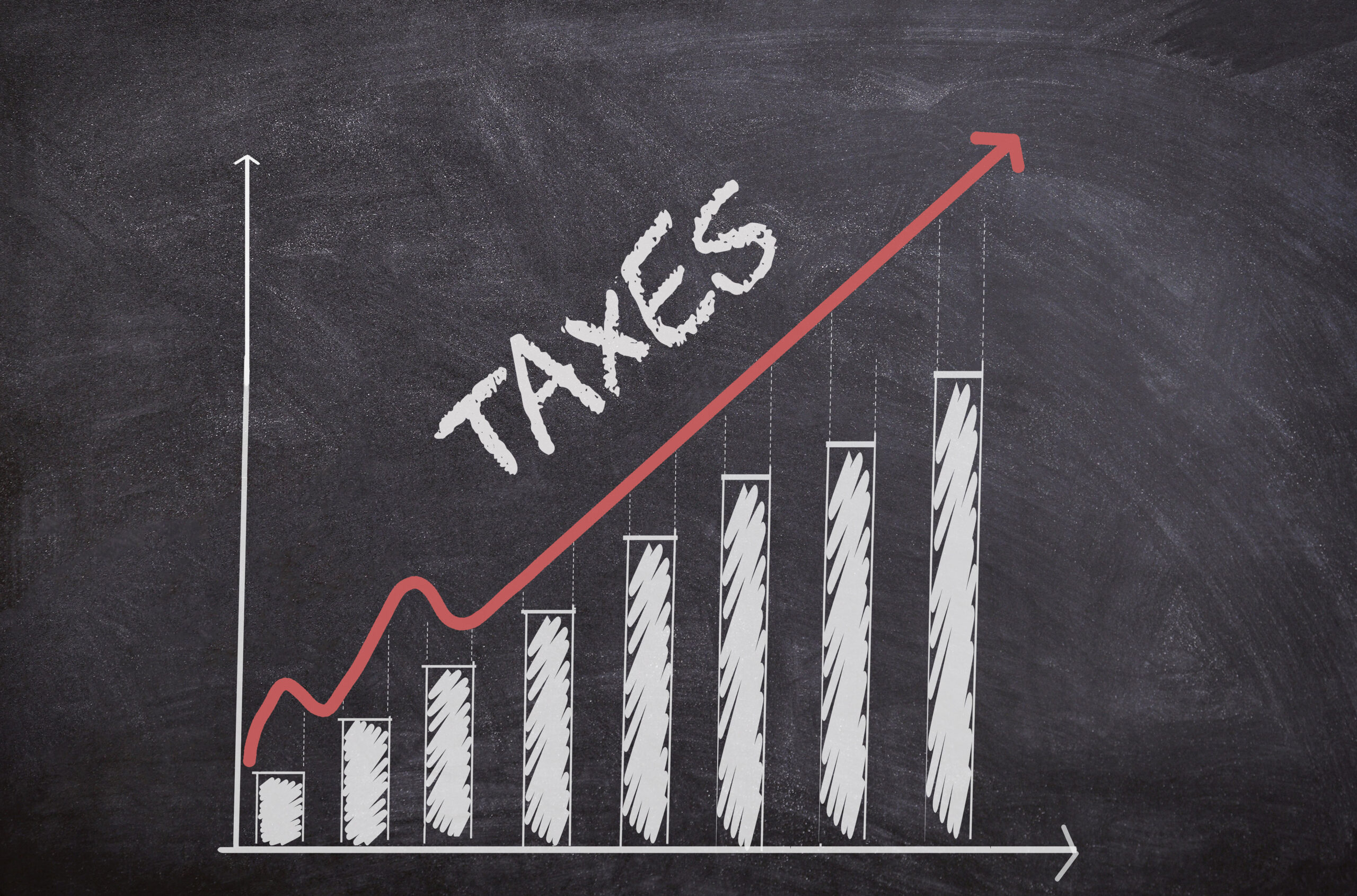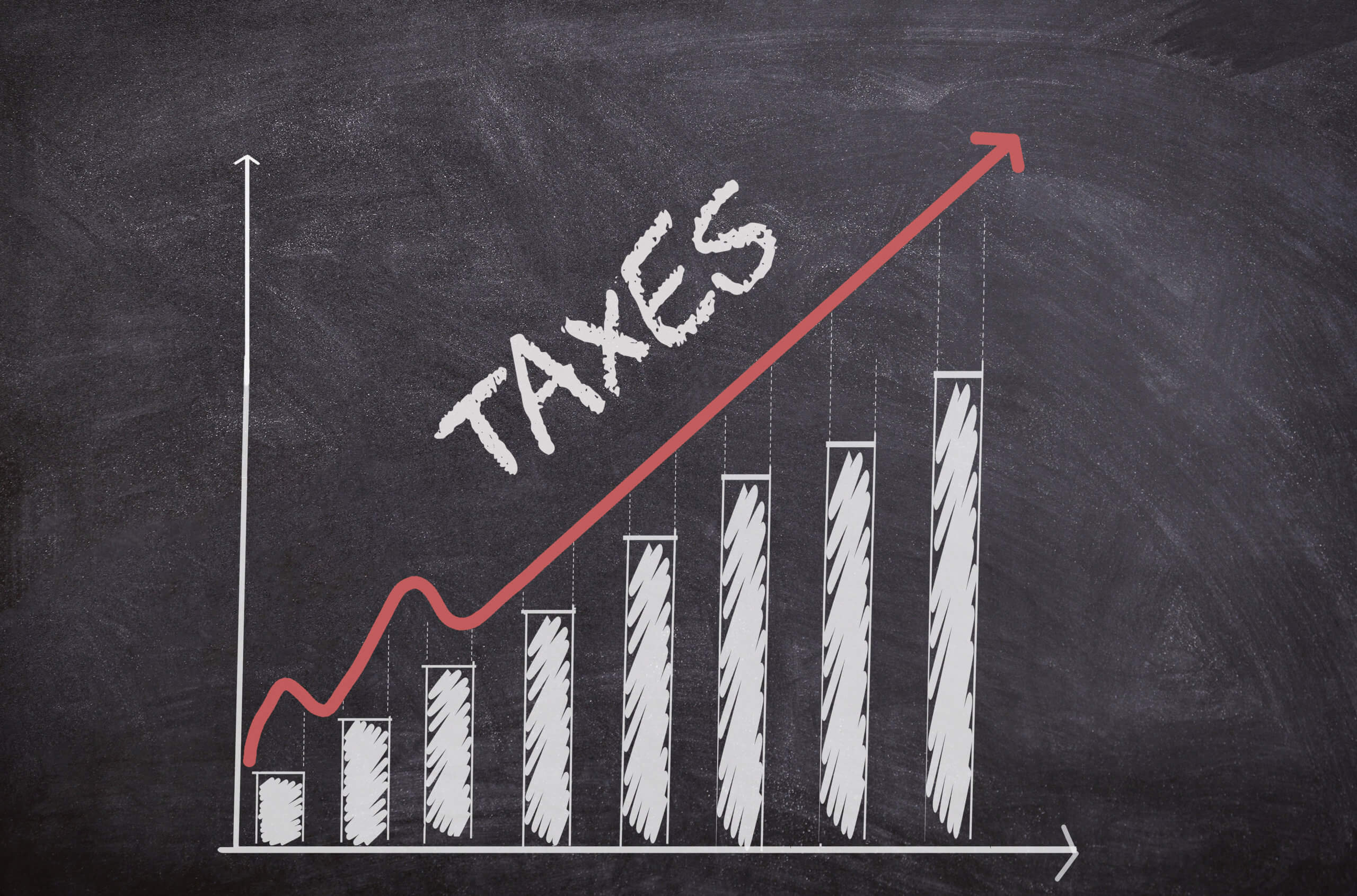Will higher taxes hurt stocks?
The proposal to raise taxes in some capacity arises in every election. Candidates for the White House are typically the most vocal about what changes they would make to the tax code if elected. It is important to remember that regardless of who wins the presidency, the president does not create tax laws. That is up to Congress. With 535 politicians involved in making tax laws, it is easy to see why many proposals by candidates for tax increases or reductions never get enacted.

Regardless, there is a common narrative about tax increases. The premise is that if tax rates are higher, there is less money available for individuals to spend, save, or invest and less money for corporations to innovate, employ, or compete – therefore the market will take a hit if tax rates rise.
There is some truth here. The more we, or the corporations we own through our stock holdings, pay the government, the less economic activity we can undertake. Of course, there have been times when tax rates have risen and the market performance in the near term was not good. But there have also been times when rates rose, and markets did well. In 2013, the tax cuts implemented under George W. Bush’s administration expired, triggering a tax increase for those making over $400,000. There was no market crash. In fact, the total return of S&P 500 Index was positive every year until 2018 when it lost just 4.38%.
In 2013, the tax cuts implemented under George W. Bush’s administration expired, triggering a tax increase for those making over $400,000. There was no market crash. In fact, the total return of S&P 500 Index was positive every year until 2018 when it lost just 4.38%.
Dimensional Funds researchers looked at market returns and tax burden scores from the Heritage Economic Freedom Index. They found no discernable connection between tax burden scores and average market returns. Further, they looked at changes in tax policy, including the imposition of higher corporate taxes and found market returns have been positive on average regardless of a country’s change in tax burden.
A tax increase would influence the economy and that certainly could affect the markets adversely. However, tax rates are just one of many factors that affect market behavior, none of which in and of themselves dictate future returns. It is never a good strategy to bet a significant part of your life savings on pundit prognostications – especially in an election year when emotions can run high. If you are a properly diversified, long-term investor who exercises discipline and patience, history is highly likely to repeat, and you should come out fine even if taxes rise and the market takes a hit.
National data breaches
The last few months have seen several data breaches. Most notably was the recent National Public Data (NPD) breach which resulted in a significant amount of consumer personal information being exposed on the dark web. Information exposed included names, addresses, phone numbers, and social security numbers for people going back decades. You can see what information of yours was exposed at https://npd.pentester.com/.
To protect yourself, you must be diligent about protecting your data and access to your accounts. Practice good digital hygiene by using strong passwords and multifactor authentication. While a cybercriminal cannot make a transaction, access your funds, or alter any account through your client portal, we have made it more difficult for them to potentially obtain important non-public information. If you have not already done so, you can learn more about the process of adding the additional security features here https://moisandfitzgerald.com/mfa/.

We also recommend you put a security freeze on your credit files with the nationwide credit reporting companies. There have been so many breaches of databases containing Social Security numbers that it is best to assume your information is available somewhere to cyber criminals. Freezing access to your credit reports makes it much more difficult for strangers to assume your identity.
For a good rundown of what freezes are and how they work see https://www.experian.com/blogs/ask-experian/credit-education/preventing-fraud/security-freeze/.
To put a freeze in place, contact each credit bureau at:
Equifax
Equifax Information Services LLC
P.O. Box 105788
Atlanta, GA, 30348-5788
888-298-0045
https://www.equifax.com/personal/credit-report-services/credit-freeze
Experian
Experian Security Freeze
P.O. Box 9554
Allen, TX 75013
888-397-3742
https://www.experian.com/freeze
TransUnion
TransUnion
P.O. Box 160
Woodlyn, PA 19094
800-916-8800
https://service.transunion.com/dss/login.page?dest=freezeStatus
Plan now to avoid the year end crush
Many tax-related transactions must occur by year-end. While the IRS has a deadline of December 31, due to the sheer volume of requests, most financial institutions will not guarantee a transaction will be completed unless initiated a couple of weeks earlier than that.
Transactions often requested in December include:
- Required Minimum Distributions (RMDs) from retirement accounts and IRAs
- Qualified Charitable Distributions (Only permitted for persons over age 70 ½ and only from IRAs.
- Transfers or donations of securities
- Sales of securities for “loss harvesting”
- Sales of appreciated securities for “gain harvesting”
- Roth conversions
Waiting until the last minute is not likely to make a significant difference in your tax bill versus the result achieved by executing these transactions earlier. By planning ahead, you can avoid the year end crush. Once you and our advisory team have determined what needs to be done, please proceed with any needed transactions. If you must wait, Schwab will not guarantee execution before year end for submissions made after November 15, 2024 unless the request is made via Schwab’s electronic authorization (not via paper or e-signed forms). The last day our staff will be able to process requests is December 20, 2024, as we will be closed beginning December 23.
News & Notes
Social Security payments and retirement plan contributions expected to rise. Several government related items such as Social Security payments, the allowable contribution amounts to IRAs and retirement plans, and the thresholds for marginal tax brackets are adjusted based on inflation readings. With inflation at lower levels in 2024 than in 2023, the increases are going to be modest. For instance, the Social Security Administration has set the 2025 cost of living adjustment at 2.5%. Contribution limits to retirement plans should also rise. We will have exact figures for you in our January newsletter.

Mike Salmon, CFP®, EA, continues to help educate the commercial real estate community. He recently conducted a webinar for Resolut RE, a brokerage firm with offices in Texas and New Mexico.
Fall Conference season is underway. Dan Moisand, CFP® served as a judge for a Shark Tank style competition for academics at the FPA National Conference in September. Contestants pitched their ideas for research they wanted to conduct that would have the most impact on the financial planning profession. The winner was Dr. Elizabeth Sinnewe of Australia’s Queensland University of Technology for her proposal, “Co-Designing Financial Education: Improving Young Women’s Financial Aptitude.”
Dan also served on a panel, “Incorporating Technology into Your Practice,” at the CFP Board Connections conference. Technology is evolving fast and with new entrants and new capabilities, it is imperative that firms have a sound process for evaluating technology. Dan explained how MFT developed its software evaluation process to assure the firm uses quality products with strong security protocols and that our CFP® professionals comply with the CFP Board’s Code of Conduct.
Important Dates:
November 1: Start of open enrollment for existing Health Insurance Marketplace enrollees
December 7: End of open enrollment for existing Medicare enrollees
December 15:
- End of open enrollment for existing Health Insurance Marketplace enrollees
- Q4 estimated tax payment deadline for C-corporation and multi-member LLCs that elect to be treated as a corporation
Saturday, December 21, 2024 – Wednesday, January 1, 2025: The offices of Moisand Fitzgerald Tamayo are closed. As has been our custom for many years, all staff have this time off so they can spend it with their families. Offices will reopen on Thursday, January 2, 2025.
January 1:
- Start of General Enrollment Period for Medicare Part A and B
- Start of Open Enrollment Period for Medicare Advantage
January 15:
- Q4 estimated payment deadline for 2024 tax year.
February 3rd for taxpayers affected by Hurricane Debby:
- Q3 2024 estimated payments normally due 9-15-24 for taxpayers that reside or have a business anywhere in South Carolina, 55 counties in Georgia, 66 counties in North Carolina and 61 in Florida including all counties in Central Florida.
May 1st for taxpayers affected by Hurricane Helene or Milton:
- Q4 2024 estimated payments (was due 1-15-25), Q1 2025 estimated payments (was due 4-15-25), filing a 2023 tax return that was on extension (was due 10-15-24), and filing a timely 2024 tax return or 2024 extension (was due 4-15-25) for taxpayers that reside or have a business anywhere in Alabama, Georgia, North Carolina, South Carolina, or Florida.
Please remember to call us: When anything significant happens in your life, including changes in your finances, family, or health that could affect your financial plan, please let us know so that we can adapt our planning and portfolio work for you accordingly. Also, if you ever fail to receive a monthly statement for one of the Schwab Institutional accounts under our management, please let us know so we may assure the respective custodian delivers your statements promptly.
Yours truly,
The Team at Moisand Fitzgerald Tamayo, LLC

